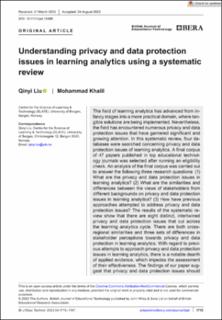Understanding privacy and data protection issues in learning analytics using a systematic review
Journal article, Peer reviewed
Published version

Åpne
Permanent lenke
https://hdl.handle.net/11250/3099494Utgivelsesdato
2023Metadata
Vis full innførselSamlinger
Originalversjon
British Journal of Educational Technology (BJET). 2023, 54 (6), 1715-1747. 10.1111/bjet.13388Sammendrag
The field of learning analytics has advanced from infancy stages into a more practical domain, where tangible solutions are being implemented. Nevertheless, the field has encountered numerous privacy and data protection issues that have garnered significant and growing attention. In this systematic review, four databases were searched concerning privacy and data protection issues of learning analytics. A final corpus of 47 papers published in top educational technology journals was selected after running an eligibility check. An analysis of the final corpus was carried out to answer the following three research questions: (1) What are the privacy and data protection issues in learning analytics? (2) What are the similarities and differences between the views of stakeholders from different backgrounds on privacy and data protection issues in learning analytics? (3) How have previous approaches attempted to address privacy and data protection issues? The results of the systematic review show that there are eight distinct, intertwined privacy and data protection issues that cut across the learning analytics cycle. There are both cross-regional similarities and three sets of differences in stakeholder perceptions towards privacy and data protection in learning analytics. With regard to previous attempts to approach privacy and data protection issues in learning analytics, there is a notable dearth of applied evidence, which impedes the assessment of their effectiveness. The findings of our paper suggest that privacy and data protection issues should not be relaxed at any point in the implementation of learning analytics, as these issues persist throughout the learning analytics development cycle. One key implication of this review suggests that solutions to privacy and data protection issues in learning analytics should be more evidence-based, thereby increasing the trustworthiness of learning analytics and its usefulness.
